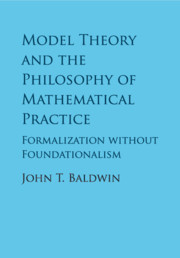1 - Formalization
from PART I - REFINING THE NOTION OF CATEGORICITY
Published online by Cambridge University Press: 19 January 2018
Summary
Suppose we want to clarify the fundamental notions and methods of an area of mathematics and choose to formalize the topic. Our notion of a formalization of a mathematical topic involves not only the usual components of a formal system, specification of ground vocabulary, wellformed formulas, and proof but also a semantics. From a model theoretic standpoint the semantic aspect has priority over the proof aspect. The topic could be all mathematics via e.g. a set theoretic formalization. But our interest is more in the local foundations of, say, plane geometry or differential fields.We set the stage for developing Thesis 1, by focusing on a specific vocabulary, designed for the topic, rather than a global framework. In any case, a mathematical topic is a collection of concepts and the relations between them. There are course other less restrictive notions of axiomatization, and often such a ‘formalism’ deliberately omits the semantic aspect. But we want the wider notion here as it reflects the model theoretic perspective.
It is not accidental that ‘formalization’ rather than ‘formal system’ is being defined. The relation between intuitive conceptions about some area of mathematics (geometry, arithmetic, Diophantine equations, set theory) and a formal system describing this area is central to our concerns. The first step in a formalization is to list the intuitive concepts which are the subject of the formalization. The second is to list the key relations the investigator finds among them. In stipulating this view of formalization, we are not claiming to fix the only meaning of the term but only the meaning most suitable for the discussion here.
Definition 1.0.1A full formalization involves the following components.
(1) Vocabulary: specification of primitive notions.
(2) Logic:
(a) Specify a class of well-formed formulas.
(b) Specify truth of a formula from this class in a structure.
(c) Specify the notion of a formal deduction for these sentences.
(3) Axioms: specify the basic properties of the situation in question by sentences of the logic.
We think of the specification in Definition 1.0.1 as given in informal set theory; the usual mathematicians’ remark ‘could formalize in ZFC’ applies.
- Type
- Chapter
- Information
- Model Theory and the Philosophy of Mathematical PracticeFormalization without Foundationalism, pp. 31 - 50Publisher: Cambridge University PressPrint publication year: 2018



